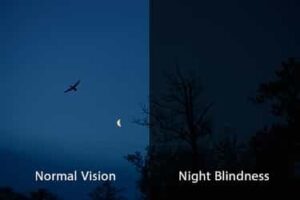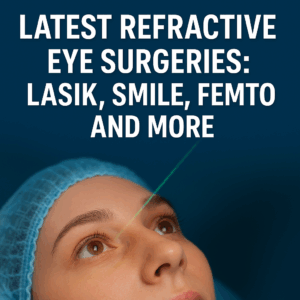
Anushka Super Speciality Eye Hospital
Call: 90044 44422 / 99213 44422 | Timings : 8.30 a.m to 5.30 p.m (Mon-Sat) | Add: Shri Swami Samarth Soc, Kaneri Dhamankar Naka, Bhiwandi




Accredited for Quality Care
Age-Related Macular Degeneration (AMD): Symptoms, Causes & Treatment Options
anushka
5 June 2025
Introduction
Age-Related Macular Degeneration (AMD) is a leading cause of vision loss
among people aged 50 and older. This progressive eye condition affects the macula, the central part of the retina responsible for sharp and detailed vision. With an increasing aging population worldwide, awareness and understanding of AMD have become more crucial than ever.
What is Age-Related Macular Degeneration (AMD)?
AMD is a degenerative condition that impairs the macula, leading to central vision loss while peripheral vision remains unaffected. It doesn’t cause complete blindness but severely hampers tasks like reading, driving, recognizing faces, or watching TV.
Types of AMD
AMD is classified into two main types:
- Dry AMD (Non-neovascular):
- Accounts for about 85-90% of cases.
- Characterized by thinning of the macula and the presence of drusen (yellow deposits).
- Progresses slowly over time.
2.Wet AMD (Neovascular):
- Less common but more severe.
- Caused by abnormal blood vessels growing under the retina, which may leak fluid or blood.
- Can lead to rapid vision loss.
Risk Factors
- Age (50+ years)
- Family history of AMD
- Smoking
- High blood pressure
- Obesity
- Light-colored eyes
- Poor diet low in
- antioxidants
Excessive UV exposure
Symptoms of AMD
- Blurred or fuzzy vision
- Straight lines appearing wavy (metamorphopsia)
- Difficulty recognizing faces
- Dark or empty area in the center of vision
- Need for brighter lighting when reading
Diagnosis of AMD
An eye care professional may use several tests to diagnose AMD:
- Visual acuity test
- Amsler grid test
- Dilated eye examination
- Optical Coherence Tomography (OCT)
- Fluorescein angiography (for wet AMD)
Conservative Management of AMD
While AMD is not curable, certain conservative measures can slow its progression, especially in early or dry AMD.
- Lifestyle Changes
- Quit smoking
- Maintain a healthy weight
- Control blood pressure and cholesterol
- Nutritional Supplements (AREDS & AREDS2)
- A formulation of vitamins and minerals including:
- Vitamin C
- Vitamin E
- Zinc
- Copper
- Lutein and Zeaxanthin
- Proven to slow progression in intermediate or advanced dry AMD
- A formulation of vitamins and minerals including:
- Dietary Adjustments
- Eat leafy greens, fish rich in omega-3s, and colorful fruits and vegetables.
- Low Vision Aids
- Magnifiers
- Special glasses
- Electronic reading aids
Medical Treatment Options for AMD
Dry AMD Currently, there are no approved medications for early dry AMD. However, for advanced cases:
- Syfovre (pegcetacoplan) and Izervay (avacincaptad pegol) have been FDA-approved for treating geographic atrophy (an advanced form of dry AMD).
Wet AMD
- Anti-VEGF Therapy
- Most common and effective treatment
- Drugs include:
- Bevacizumab (Avastin)
- Ranibizumab (Lucentis)
- Aflibercept (Eylea)
- Faricimab (Vabysmo)
- These injections inhibit the growth of abnormal blood vessels and reduce leakage.
- Photodynamic Therapy (PDT)
- Uses a light-sensitive drug (verteporfin) activated by a laser to destroy abnormal blood vessels.
- Laser Photocoagulation
- High-energy laser seals leaking blood vessels.
- Less commonly used due to risk of damaging surrounding tissue.
Living with AMD
- Use high-contrast and large-print materials
- Install better lighting at home
- Utilize talking devices and apps
- Join support groups for emotional and practical assistance
Frequently Asked Questions (FAQs)
Q1. Is AMD curable?
No, AMD is not curable, but early detection and treatment can help slow its progression and preserve vision.
Q2. Can lifestyle changes really make a difference?
Yes. Quitting smoking, eating a balanced diet, and managing health conditions like hypertension can significantly reduce the risk or slow down progression.
Q3. How often should I get my eyes checked for AMD?
If you are over 50 or at risk, you should have a comprehensive dilated eye exam annually or as advised by your eye care provider.
Q4. What are drusen?
Drusen are yellow deposits under the retina often found in dry AMD. Their size and number can indicate the stage of the disease.
Q5. Do supplements help everyone with AMD?
The AREDS2 formula is effective mainly for people with intermediate to advanced stages of AMD. It is not a preventative measure for those without the condition.
Q6. Can AMD lead to total blindness?
While AMD affects central vision, it does not usually cause complete blindness as peripheral vision remains intact.
Q7. Are there any new treatments on the horizon?
Yes, ongoing research includes gene therapy, stem cell therapy, and long-acting drug delivery implants to reduce injection frequency.
Conclusion
Age-Related Macular Degeneration is a serious condition that can significantly impact quality of life. Early diagnosis, regular eye exams, a healthy lifestyle, and appropriate treatment are vital in managing this disease effectively. By staying informed and proactive, patients can better navigate the challenges of AMD and preserve their independence for as long as possible.
If you or a loved one experiences any symptoms of AMD, consult an eye care specialist promptly for evaluation and guidance.
Recent Posts


